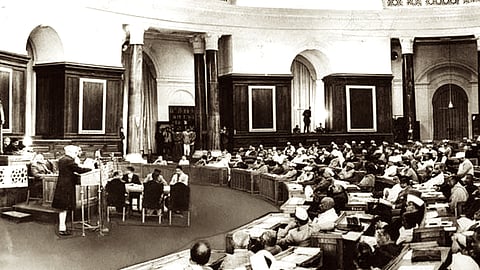- Commentary
- History Vignettes
- Notes on Culture
- Dispatches
- Podcasts
- Indian LanguagesIndian Languages
- Support

WE UNEARTHED THIS GEM of an essay while excavating our archives at The Dharma Dispatch. This brief commentary appears in the Gokhale Institute’s journal dated August 1955 under the “A Lay Student” byline. The commentary is about the kind of Hindus who drafted lethal legislations related to the Hindu society and culture.
We have reproduced the entire commentary verbatim.
Happy reading!
THE MISFORTUNE OF HINDU SOCIETY today is that power to affect its law and life has fallen into the hands of persons whose Hinduism is to be found only in official entries of personal particulars in public documents like census records.
Their knowledge of the Hindu scriptures is of the hearsay kind, and their faith in their teaching is less than skin-deep. They feel apologetic about practices and beliefs which the Western world is unable to endorse. Not that they prefer the Christian or the Moslem or other any other religion to Hinduism. As such, they find all religion sniffed at by their inner nature as so much gibberish. The good to them is that which is good to eat; the true is that which is true to the hand-grasp. They have no feel for any values less gross. Their one passion is for what they regard as " modernism" — to make India a replica of America or Russia.
They think that India must adapt herself to world-conditions and do not pause to consider whether India may not persuade the world to adopt her scale of values and her ideals of social organization.
In their zeal for modernism, they forget that the joint family is socialistic in spirit and working, and little do they care if it goes shattered by the over-development of individualism instigated by a law full of encouragement to partition claims.
It is nothing to them that the certainty of equal share for the daughter in her father's property may possibly weaken her attachment and her loyalty to her husband's house and may so lead to domestic and social complications. And they have little patience for the other-worldly and filial-service (Pitr-Rna) aspects of inheritance.
These reformers are as far out of touch with the norm of the living Hindu mind as to the ethos of the Shastras. Their eye is riveted on conditions of living in urban localities and in strata of society touched by English education and cash prosperity. And they think little of and feel much less with the far vaster rural community and its environment.
The outstanding fact about them is not that they are rationalistic and scientific, as they suppose to be, but that they are latitudinarian and imitative. If they were scientific, they would have appreciated the inapplicability of the objective methods of test and proof derived from the physical sciences to matters of Faith like Punya and reincarnation of the soul which are of the realm of religion.
If they were rational, they would see that a man's concern for his after-death virtue is as natural as his love for his progeny. Lacking the habit of self-introspection, they have not come even under the salutary restraint of a doubt as to the sufficiency of their understanding and insight. They are taking short views where the longest views possible are called for. They are valuing things of the surface above things of the deeper realms of man's being.
The Dharma Dispatch is now available on Telegram! For original and insightful narratives on Indian Culture and History, subscribe to us on Telegram.
